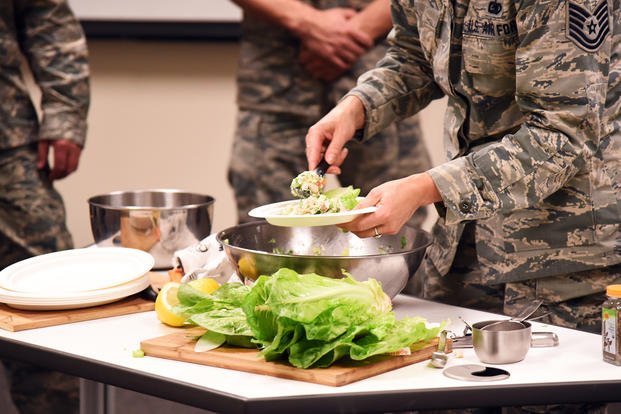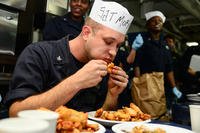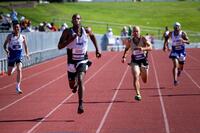Ever wonder how much what you eat matters to how well you perform? A recent Army study on special operations students helped determine that performance increases with the quality of food consumed.
Information on demographics and health characteristics were obtained before the start of the Army Special Forces Assessment and Selection (SFAS) Course. The study focused on the following typical demographic information of the individual, caloric intake value and physical fitness assessments:
Basic data
This included age, education, cigarette and smokeless tobacco use, etc. Students were asked to detail the amount of preparation they did before entering the Special Forces training pipeline, including but not limited to: training time per day, days per week and overall time spent pre-training, using various types of resistance and aerobic training. The questionnaire covered everything from miles per week progressions (running/rucking), calisthenics, weightlifting, high-intensity interval training (HIIT), TRX and other programs.
Food quantity and quality
The study then focused on diet quality before joining the SFAS pipeline. Questioning was extensive, paying attention to daily consumption of foods and total caloric intake. The times per day and amount of food eaten each meal set an average of daily caloric intake. All food groups and macronutrients were assessed, especially the quality of food with regard to additives (sodium, fatty acids, sugars, refined grains) as well as vitamins, minerals and antioxidants to help determine the quality of foods eaten.
Fitness assessment
The students in the study performed several physical events as routine requirements during SFAS, including the Army physical fitness test (PFT), pull-ups, longer distance timed runs, longer distance timed loaded road marches, obstacle courses and land navigation assessment. Finally, after SFAS, students either will be selected or not. That is the ultimate performance issue tested in the end.
Results of the study: Physical markers for success
Higher scores (being selected) were significant among students who were older (25+), had more than a high school education, had a higher body mass index (25+), performed longer-duration resistance training workouts (weights/TRX) and were non-smokers.
Markers that were insignificant toward selection and performance included whether the candidate was an officer or enlisted; performed longer periods of aerobic exercise; and used calisthenics, machine weights and other exercise programs. Smokeless tobacco use and caloric intake also were insignificant factors.
Higher APFT and ruck/longer run times were associated with being selected. However, obstacle course times and even the number of land navigation points found were insignificant, though you had to pass those above the minimum standard regardless.
Lifting weights six to seven hours a week before selection has a higher correlation to success and drives the need for cleaner eating during the recruit preparation process. A high diet quality allows for the longer workouts that are required.
In tactical fitness training, putting in the time is required. There is no 30-minute gym routine that will prepare you adequately for a day of special ops training. Usually, an hourlong lift with calisthenics, followed by a run and a ruck, will take a few hours or more each day. This is required if you want to get selected successfully.
Another finding was that the more mature athlete has learned skills to recover better, eat healthier for energy to train, and train smarter. Being a former athlete with years of training, recovery and competing cycles previously performed helps you transition into the high-level tactical athlete who needs the perfect balance of recovery, nutrition and periodization training (resistance, cardio, load bearing, mobility).
You are what you eat: Higher sodium required (if sweating profusely)
Having a higher vegetable score made a significant impact on rucking scores. Beans and greens were significant to higher APFT scores and run/ruck times. Seafood and plant-based protein were significant factors to faster road march times as well. There were no significant associations between total fruit, whole fruit, whole grains, dairy, total protein foods, or fatty acid ratio score and any physical performance measures.
Another indicator of performance was the increase of sodium consumed by those who scored higher in faster rucking events. This makes sense, as one of the big issues with longer road marches is electrolyte replacement and water consumption. Maintaining sodium levels is critical for performance, especially when in hot/humid or arid environments. There were no significant associations between added sugars or saturated fats and individual component scores and physical performance.
The study specifically linked high-performing successful selection candidates with diet quality and physical performance, both before and during selection (test). Not only are there challenging physical demands in this training, with decreased sleep recovery time, but arduous cognitive tasks that require thinking under pressure.
A direct link between higher diet quality and higher selection performance was proven in this study, with the notable exception of increased sodium levels. The faster you could ruck was the number one performance measure for successful selection. A higher sodium intake had a direct link to higher performance in both the APFT to get to the training and the high-mileage ruck marches to get through the training.
This research was conducted under a memorandum of agreement between the U.S. Army Special Operations Command and the U.S. Army Research Institute of Environmental Medicine.
Stew Smith is a former Navy SEAL and fitness author certified as a Strength and Conditioning Specialist (CSCS) with the National Strength and Conditioning Association. Visit his Fitness eBook store if you’re looking to start a workout program to create a healthy lifestyle. Send your fitness questions to stew@stewsmith.com.
Want to Learn More About Military Life?
Whether you're thinking of joining the military, looking for fitness and basic training tips, or keeping up with military life and benefits, Military.com has you covered. Subscribe to Military.com to have military news, updates and resources delivered directly to your inbox.
















